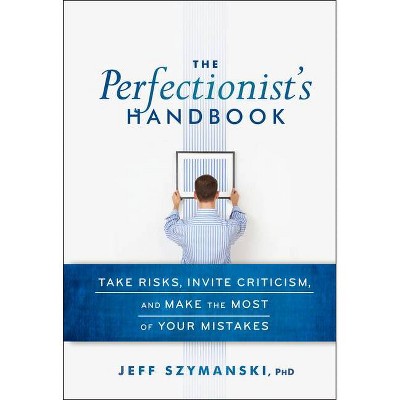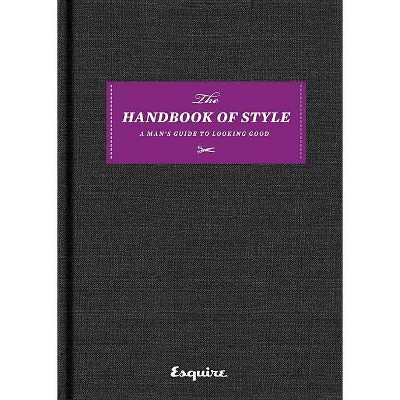The Perfectionist's Handbook - by Jeff Szymanski (Hardcover)

Similar Products
Products of same category from the store
AllProduct info
<p/><br></br><p><b> About the Book </b></p></br></br>"Go for the gold. Achieve. Stand out. It's the American way to aim for perfection and excel in business, school, sports, and life. We're all trying to do more in less time and feeling overwhelmed as a result. But too many people in business are ineffecient, self-sabotaging perfectionists. If you spend three hours editing an annual report to get it 90% perfect, and then spend another two hours to get it 93% perfect, and another hour for 95% perfect, the incremental improvement is negligible. Think of the time and effort you can conserve and redistribute to other tasks. Unlike other negative advice given, to give up your perfectionism, The Perfectionist's Handbook challenges this mindset which makes it unique. Jeff Szymanski tells readers they got the right idea, but you're taking the wrong paths to achieve the outcome you want.The Perfectionist's Handbook teaches the art of being an Adaptive Perfectionist, someone who stands out and gets bigger playoffs: greater productivity with less effort, more energy, and balance in your work and life. Jeff's strategies to function more effectively and better reach your goals include: Analyze Your Effort Focus on Your Top 10 List Lose the Parachute Embrace Failure Shift and Delegate Secretly Observe Others Refuel and Refresh Invite Criticism "--Provided by publisher.<p/><br></br><p><b> Book Synopsis </b></p></br></br><b>A guide for getting your perfectionism to work for you</b> <p>Is perfectionism a good thing or does it get in our way? In <i>The Perfectionist's Handbook, </i> clinical psychologist Jeff Szymanski helps readers navigate their way out of the perfectionism paradox: if your intentions are good (wanting to excel) and the outcomes you want are reasonable (to feel competent and satisfied), why would perfectionism backfire and result in unhappiness and stress? Learn when perfectionism will pay off, and when and why it sabotages you. Specific strategies are outlined throughout the book to help readers transform their perfectionism from a liability to an asset.</p> <p>There is no reason to eliminate perfectionism altogether--instead, build on what's working and change what's not. <i>The Perfectionist's Handbook</i> helps readers to: </p> <ul> <li>Distinguish between intention and strategy as a way of improving outcomes</li> <li>Identify diminishing returns and how to redistribute time and resources</li> <li>Make the most of mistakes rather than being preoccupied with trying to avoid them</li> <li>Learn to focus on your Top 10 list as a way of getting the most out of your life</li> <li>Access others more effectively as a way of improving performance</li> <li>Obtain more balance in their lives</li> </ul><p/><br></br><p><b> From the Back Cover </b></p></br></br><p><b>"You're such a perfectionist."</b> Are you supposed to feel insulted or flattered when you hear this comment? Is someone saying that you are detail oriented, organized, and driven to excel? Or that you are controlling, rigid, and self-defeating? Is your perfectionism a good thing, or does it get in your way? <p>In <i>The Perfectionist's Handbook</i>, Jeff Szymanski helps readers navigate their way out of the "perfectionism paradox" If your intentions are good (wanting to excel) and the outcomes you want are reasonable (to feel competent and satisfied), why would your perfectionism backfire and result in unhappiness, stress, and unwanted results? Many people consider their perfectionism to be one of their most valuable attributes and critical to success in achieving one's life goals. Advice aimed at trying to stop you from being a perfectionist doesn't ring true. <p>Jeff Szymanski, a clinical psychologist specializing in anxiety and obsessive-compulsive disorder (OCD), helps readers understand when their perfectionism will pay off, and when and why it sabotages you. Specific strategies are outlined throughout the book to help readers identify the difference between their "healthy" and "unhealthy" perfectionism. There is no reason to eliminate perfectionism altogether--rather, build on what is working and change what is not. In addition, <i>The Perfectionist's Handbook</i> helps readers to: <ul> <li>Distinguish between intention and strategy as a way of improving outcomes</li> <li>Identify diminishing returns and ways to redistribute time and resources</li> <li>Make the most of mistakes rather than being preoccupied with trying to avoid them</li> <li>Learn to focus on your "Top 10" list as a way of getting the most out of your life</li> <li>Interact with others more effectively as a way of improving performance</li> <li>Establish more balance in your life</li> </ul> <p>Transform your perfectionism from a liability to an asset. Let your instincts lead you to achieve your goals--but <i>also</i> learn to enjoy your journey and its rewards.<p/><br></br><p><b> About the Author </b></p></br></br><p><b>JEFF SZYMANSKI, PHD, </b> is the Executive Director of the International OCD Foundation; a Clinical Instructor in Psychology at Harvard Medical School; and a Clinical Associate in Psychology at McLean Hospital. For more information, please visit: www.jeffszymanski.com and www.theperfectionistshandbook.com. </p>
Price History
Cheapest price in the interval: 20.49 on October 27, 2021
Most expensive price in the interval: 20.49 on November 8, 2021
Price Archive shows prices from various stores, lets you see history and find the cheapest. There is no actual sale on the website. For all support, inquiry and suggestion messages communication@pricearchive.us



















